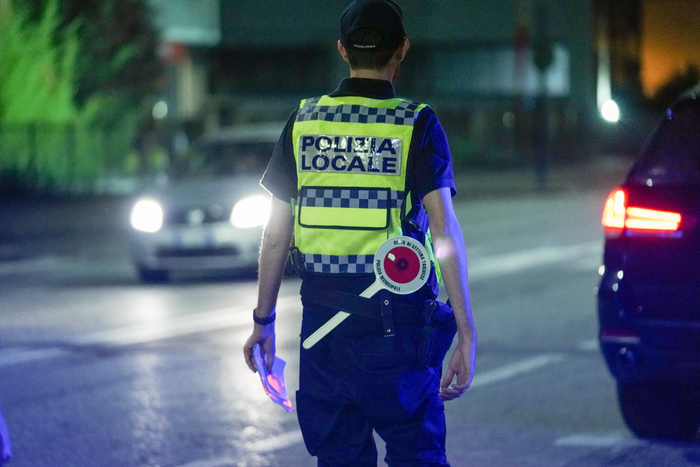The consumption or possession of drugs on the street will no longer necessarily be punishable by a fine.
The PSOE, United We Can, PNV, ERC, Junts and EH Bildu, the six parliamentary groups in favor of reforming the citizen security law, better known as the
gag law
, reached an agreement on Tuesday so that the fines that this rule now imposes for the “planting, cultivation, consumption or illicit possession of toxic drugs, narcotics or psychotropic substances” in public places when they do not constitute a crime can be replaced by “treatment or rehabilitation, if necessary, or re-education activity” if so requested by the person himself offender, according to sources familiar with the content of the negotiations.
The current wording of the gag law, in force since the then parliamentary majority of the PP approved it in 2015, classifies in article 36 this consumption or possession as a serious administrative offense "even if they were not intended for traffic, in places, roads, public establishments or collective transport, as well as the abandonment of the instruments or other effects used for it in the aforementioned places”, which implies a fine of between 601 and 30,000 euros.
Only in the event that the perpetrator was a minor was he allowed to be replaced by re-education activities.
Now it is intended that this possibility be extended to all offenders, regardless of their age.
The new text is proposed by United We Can.
More information
Disobedience to the police will only be punished if there is "bodily opposition or physical force"
The agreement of the six parties establishes that this substitution of a fine for "remedial, re-educational or rehabilitation" activities be extended to other infractions that, until now, the gag law also punishes with fines.
It is about the consumption of “alcoholic beverages in places, roads or public transport” when it seriously disturbs the tranquility of the citizenry (known as large bottles);
the "damage or tarnishing of goods for use or public service", the abandonment of domestic animals and "the scaling of buildings or monuments without authorization".
In all cases, if the sanctioned person does not fulfill his commitment to carry out this activity, "the economic sanction will be executed", according to the text of the new article 53 bis agreed by the parties and to which EL PAÍS has had access.
The meeting of the six parties on Tuesday also made it possible to reach an agreement to reform article 33, which sets the graduation of sanctions.
Specifically, and in line with the joint amendment presented by PSOE and United We Can, to detail what parameters will be taken into account to set the amount of the fine.
Until now, the rule simply specified that "the economic capacity of the offender" would be taken into account, without further specification.
The agreement now reached proposes to reduce the penalties of the gag law by 50% if the offender earns less than 1.5 times the minimum interprofessional salary (SMI), currently set at 14 payments of 1,000 euros.
Until now, this reduction only occurred when the sanctioned person availed himself of the voluntary payment.
The reduction will be 25% when the offender receives between 1.5 and 2.5 times the SMI.
The agreement in both articles supposes an advance in the negotiation to reform the gag law, until now slower than expected.
In fact, the work of the parliamentary report has been paralyzed since March after having reached agreements on only thirty articles.
For this reason, PSOE, United We Can, ERC, PNV, EH Bildu and Junts agreed to hold preparatory meetings to iron out differences and be able to attend the next meeting of the former with a text already closed to speed up the parliamentary process and avoid the frontal opposition of the parties. right.
It has been in one of these meetings where the new agreements have now been reached.
However, important discrepancies have also emerged at these meetings.
In fact, the six parliamentary groups are leaving for the end of the negotiation the points that have become a stumbling block to reaching an agreement.
Among those that have been postponed is article 23, which must include the police use of riot gear and, specifically, the controversial rubber balls.
The PSOE defends that they continue to be used, but with a protocol that strictly regulates when and how to do it.
However, ERC and EH Bildu demand its prohibition and have shown their discomfort at the decision of the Ministry of the Interior to acquire nearly 60,000 rubber balls in the last year.
Another of the articles whose reform generates controversy among the parliamentary partners is 37.4, which contemplates fines for disrespect to the police.
The Socialists did not want to touch the current wording, although they recently presented an alternative text that has not convinced all the groups, considering that it lends itself to the arbitrariness of the agents.
Sources familiar with the negotiations indicate that, at the moment, the parties are working on a text that details what is meant by humiliating and offensive acts and expressions towards the police.
Subscribe to continue reading
read without limits
Keep reading
I'm already a subscriber

/cloudfront-eu-central-1.images.arcpublishing.com/prisa/DZMIQBOOVBBIBG7DM5F36TCHXE.JPG)

/cloudfront-eu-central-1.images.arcpublishing.com/prisa/VZV6NXS7SREIJAIZZNECDP7DZA.jpg)



/cloudfront-eu-central-1.images.arcpublishing.com/prisa/RUNTVUOYUJENUN2EWKUKWGRZPI.jpg)

